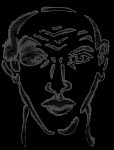
*". . . Poetry, being elegance itself, cannot hope to achieve visibility. In that case, you ask me, of what use is it? Of no use. Who will see it? No one. Which does not prevent it from being an outrage to modesty, though its exhibitionism is squandered on the blind. It is enough for poetry to express a personal ethic, which can then break away in the form of a work. It insists on living its own life. It becomes the pretext for a thousand misunderstandings that go by the name of glory. . . .
Beauty is always the result of an accident. Of a violent lapse between acquired habits and those yet to be acquired. It baffles and disgusts. It may even horrify. Once the new habit has been acquired, the accident ceases to be an accident. It becomes classical and loses its shock value. A work, therefore, is never perceived. It is received. If I am not mistaken, this was a remark made by Eugene Delacroix: "One is never perceived, one is received." It is a maxim frequently repeated by Matisse. Those who actually saw the accident hasten away, overwhelmed, unable to describe it. Those who did not see it are left to bear witness. This opportunity to make themselves seem important pro-vides the medium through which they express their stupidity The accident remains in the road, bloodied, petrified, awful in its solitude, a prey to gossip and police reports.
The inaccuracy of such gossip and such reports is not exclusively the result of distraction. It has more solid roots. It is closely related to the genesis of myth. Man seeks to escape himself in myth, and does so by any means at his disposal. . . . unnable to withdraw into himself, he disguises himself. Lies and inaccuracy give him a few moments of comfort, the trifling feeling of escape experienced at a masked ball. He distances himself from that which he feels and sees. He invents. He transfigures. He mythifies. He creates. He fancies himself an artist. He imitates, in his small way, the painters he claims are mad.
Journalists know this, or at least sense it. The inaccuracies of the press, and the banner headlines by which they are trumpeted, are soothing draughts to this thirst for the unreal. Sadly, no authority presides in this case over the model's metamorphosis into a work of art. But it is this bland metamorphosis that demonstrates the need for myth. Accuracy is vexing to a crowd of would-be fantasizers. Hasn't our age coined the term "escapism," when in fact the only way to escape oneself is to allow 9neself to be invaded?
It is for this reason that fantasy is detestable. People confuse it with poetry whose modesty consists of masking its own equations. Its realism depicts a very strange reality, intrinsic to the poet who uncovers it and who is determined never to betray it.
Poetry is a religion without hope. The poet exhausts himself in its service, knowing that, in the long run, a masterpiece is nothing but the perform-ance of a trained dog on very shaky ground.
Naturally, he consoles himself with the illusion that his work is grounded in some more concrete mystery. But this hope comes from the fact that every man is a night (harbors a night), that an artist's task is to bring that night into the light of day, and that this secular night provides a comforting extension of man's severe limitations. Man thereby becomes a sort of sleeping cripple, dreaming that he can walk.
Poetry is an ethic. By ethic I mean a secret code of behavior, a discipline constructed and conducted according to the capabilities of a man who rejects the falsifications of the categorical imperative.
This personal morality may appear to be immorality itself in the eyes of those who lie to themselves, or who live a life of confusion, in such a manner that, for them, a lie becomes the truth, and our truth becomes a lie. . . ."
I have even reached the point where I am no longer aware of censure,
being too engrossed in my ethic. (I wrote in Le coq et l'arlequin1: "We
shelter an angel within us. We must be the guardians of that angel.").
. . .
I call a work of art the sweat of this ethic. Any work that is not the sweat of an ethic, any work not stemming from an exertion of the soul's will more strenuous than any physical labor, any work that is too visible (since the personal ethic and the works of art it engenders cannot be seen by those who live without an ethic, or who are content to follow a standardized code), any work that persuades too readily, will be but a decorative fantasy. It will please because it will not require the listener to subordinate his own personality to the personality of the speaker. It will allow the critics and those who defer to them to recognize it - and to recognize themselves in it - with a cursory glance. Yet beauty cannot be recognized with a cursory glance.
As it develops, this ethic will become a kind of insult. It will persuade only those who are able to abandon themselves to a greater force, and those who love more than admire. It will accumulate neither subscribers nor admirers. It will only make friends. . . . "